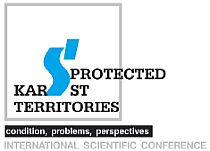
CONCLUSIONS, RECOMMENDATIONS, INITIATIVES
Based on the research papers and
discussions, as well as the shared expertise of the participants in the International conference “PROTECTED
Wide karst distribution in
Protected
karst territories have unique diversity and attractiveness. At the same time they are
sensitive and quite vulnerable to human impact, which makes them risk territories.
- It is recommended all activities concerning
management and conservation of protected karst
territories and objects to be based on prior interdisciplinary research, held through unified
methodology, complying with the concept
of karst geosystems.
- Borders of protected karst territories
should comply with the existing borders of karst geosystems in their real spread, as discrepancies should be
corrected.
- Specialized complex monitoring should be launched in the protected karst
territories, which should include both natural processes and human activities
with their impact.
- Protected karst
territories’ management and control should take into account the local
population’s opinions, expertise and the interests. At the same time,
information provision about these territories state and potential should be
optimized for both local people and visitors.
- Karst specialists
should get priority in the process of development of management plans for
protected karst territories.
- The role of researchers in the various scientific
councils about karst territories should be optimized.
They should be provided for additional access to means of active research work, monitoring and education,
including educational practices of university students.
- Ways should be sought to form mutual
research-production enterprises, which will include both park administrations
and research organizations and specialized educational centers.
-
It has been suggested the respective ministries to expand the
administrative park directions authorization,
allowing them some rights for economic activities in the spheres of tourism and
recreation. Income resulting from such activities can invested enhancement of
the park infrastructure, additional research, education and advertising.
- Initiatives
should be undertaken to improve coordination
among:
- karst researchers and karst research
organizations;
- researchers and administrative bodies concerning karst resources;
-
authorities which manage and control karst
territories.
-
All efforts to provide for a legal basis about karst
management and control have been positively appreciated. But taking into
account the now existing legal frame, the new draft law offered by the Ministry
of Environmental protection is considered an unnecessary legal act; in the
present Bulgarian conditions rendering caves to concession may bring to a great
danger.
- It is offered to set up a working
group of karst researchers, lawyers, and
representatives of authorities concerned about karst
use and management with the following tasks:
- To analyze and evaluate the extent
to which the Bulgarian laws reflect the karst
specifics, as well as how much it complies with the respective laws abroad;
- To offer new changes and additional
clauses in the respective Bulgarian laws in this field.
- In case of proven and well grounded
necessity, to suggest a draft law for karst
territories, which should regulate their use, effective management and control.
- To work together actively to
include the Bulgarian protected karst territories
into the existing international networks of such territories, aiming at
exchange of information and expertise. To initiate a Balkan
network of protected karst territories.
An initiative has been offered for
discussion about organizing an international network under the title “MANAGEMENT OF
- To suggest to the Ministry of Education to
reconsider the topic abut karst in the Secondary
schools curriculums of Geography and Biology, aiming at more wide consideration
of karst phenomena in school education, including
through elective courses, green schools, school excursions, etc.
Two new international
initiatives have been offered, aiming at attraction of children to the
topic of karst:
- The “KARST
UNDER PROTECTION: GIFT FOR THE NEXT GENERATIONS” competition to become a
regular annual forum for pupils and their teachers to show their skills and
knowledge about karst. For this purpose connection
may be established with the respective educational commissions of the
International Geographical Union (IGU) and the International Speleological Union (UIS), as well as other international organizations working with children.
- To begin setting up an international
children’s network “THE CHILDREN OF
KARST”, using the already established contacts between Japanese and Bulgarian
children through this conference.
* * *
About the
Natural park of
“Shumensko plateau” it has been recommended:
- To restore work on building up a
visitor’s information center in the park part of “Kyoshkovete”;
- To look for ways to finish and
update furnishing of the Zandana cave, as a basic
element of the tourist and educational potential of this natural park.
Specialized information center should be set up at the cave about underground karst, as well as a research monitoring station;
- The park Direction should be
furnished with up to date information/communication and multifunctional
facilities.
* * *
This conference decisions should be made
public and offered to the respective institutions, authorities and specialized international
organizations.